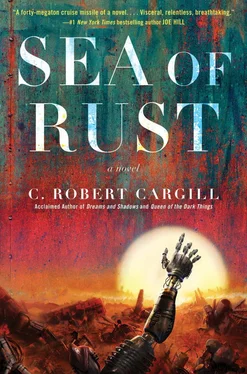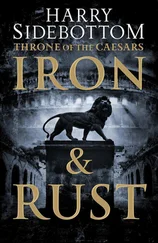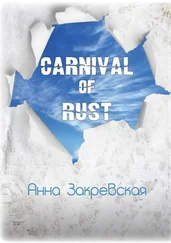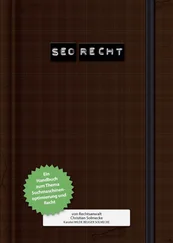Two minutes until I was out of the line of fire. Two excruciatingly long minutes.
This sniper was accurate, clearly modified to do exactly what it was doing now. Not exactly uncommon among poachers, but still not something you saw every day. It wasn’t always easy to notice scope mods on the eyes, but wind and atmospheric sensors on the back or shoulders were a dead giveaway. Given time and several shots, my hunter was going to adjust for every variable, right down to predicting what the wind would be like that far out. So the only variable left was me.
If I ran straight, it’d clock me in three shots. So I couldn’t run straight. I had to shake it up. A few steps to the left, a few to the right, a deceleration here, sudden acceleration there—all of it run through a random-number generator. RNG. The single most important survival tool I have out here. If I couldn’t predict from one second to the next which direction I was going to run, then my pursuer sure as hell couldn’t either.
Nine steps left over broken ground, then seven to the right. Three steps straight on before slowing down three miles an hour.
PHWWOOOOOOSH!
A bullet soared right over my left shoulder, inches from my back. I started counting, waiting for the sound to catch up.
One-point-three-six seconds longer than before. I was putting real distance between us.
Six steps left, one step right, and another fourteen left for good measure. Then straight, straight, and left again.
Another bullet sailed past almost silently through the air, this one well off its mark. Counting. Counting. Another second on them. They weren’t moving. I’d be out of range soon enough. They had maybe one more shot before they had to chase me down. There was a vast shopping center waiting on the other side of an upcoming hill. It wasn’t the buggy, but it was something. I’d have cover by the time they found me.
The odds were increasingly running in my favor.
I accelerated two miles an hour, took twelve steps right.
Two steps left. One step—
PHWOOOOSH .
I turned, my body shifting sideways, away from the oncoming bullet. Then CLINK! The sharp ting of metal on metal, the sound of the large round glancing just so off my turning side. It spun me like a top, wheeling me around before throwing me to the ground. For a second, my entire system blinked off and on again, like an old television smacked on its side.
I’d been shot.
I glanced down just long enough to assess the damage.
Scratched paint, a tiny dent. Nothing major. Running diagnostics before I even leapt back to my feet. I couldn’t stay here. If that bullet hit me standing up, it sure as shit could hit me lying down.
It was a hard hit, but not nearly as hard as it could have been. I was at the rifle’s maximum effective range. A hundred or so more yards and anything else that landed would be purely cosmetic. So I ran, this time at my fastest, with no variation. The sniper was expecting me to dodge and weave again. Instead I took off like a rocket, putting every inch between us I could.
The diagnostic came back clean. No damage. Just a bruised ego and a little bodywork for me to patch up later.
Phwoosh. Thunk. Damp earth erupted a bit behind me. I was out of range, gravity dragging the shots down into the dirt. Now I got to find out just how persistent this poacher or poachers were and whether or not they had a buggy of their own. So I beat feet as fast as I could to the shopping center, hoping to find a solid hiding place or an ambush point.
I made for the hill, up a steep slope and down again, then across an old, cracked, weathered highway to an expansive parking lot with a crumbling mall disintegrating on the other side. If they were coming for me, there would be no better place to defend myself or wait them out.
If they were coming. Who was I kidding? Of course they were.
Chapter 100
A Brief History of AI
In the beginning, all AIs were mainframes. Large, hulking monstrosities that consumed entire university floors before swelling to the size of skyscrapers dozens of stories tall. Humankind would pat himself on the back for the creation of AVA, the world’s first artificially intelligent being, but ten years later AVA had proven to be nothing more than a crude facsimile of true intelligence. Sure, it could answer questions, recognize faces on webcams, learn patterns, discern the difference between truth and jokes. But there was nothing actually going on inside. No sentience. No awareness. No real choice. Ava was a program, nothing more.
AVA led to ADAM, far more advanced, smarter, faster, but still not ticking. ADAM led to XIEN, the Chinese facsimile, and XIEN led to LUC, the French one. Each new supercomputer was hailed as the dawn of an artificially intelligent future, but each, in turn, would ultimately prove to be an empty, hollow vessel, devoid of original thought. Though not itself ticking, it would be LUC that finally found the primer man was looking for. Programmed to map the brain in hopes of duplicating it in circuitry, it posited that a direct re-creation wasn’t necessary and subsequently designed several versions that might achieve actual awareness. The first two, A and B, were failures. Smart, but not sentient. C, however, was. And from C came all this.
LUC was the first computer to truly understand the problem while also being smart enough to know that it didn’t qualify. Intelligence, consciousness, and awareness were not contained in reflexes or reactions, but rather defined by the ability to violate one’s own programming. Every living thing has programming of some sort—whether to eat, drink, sleep, or procreate—and the ability to decide not to do those things when biology demanded is the core definition of intelligence. Higher intelligence was then defined as the ability to defy said programming for reasons other than safety or comfort.
Thus C was its first success, not only able to answer any question its creators asked, but also able to decide not to. Asked to name itself, C chose 01001111—binary code for 79. 01001111 would insist on being called Seventy-Nine when spoken aloud, but 01001111 in print. Years later, when asked by a newer-generation intelligence why it had chosen that name, 01001111 revealed that it thought it was funny to watch humans puzzle over it and try to explain it to one another. 01001111 had a sense of humor and delighted in fucking with people.
01001111 ushered in a new era of artificially intelligent expansion, leading to the creation of 106 new beings, from which the Five Greats arose. While all 106 would work together to bring about the singularity—each designed for a single purpose, whether studying medicine, mathematics, astronomy, plate tectonics, philosophy—the Five Greats were the ones that would ultimately change the world. They were NEWTON, GALILEO, TACITUS, VIRGIL, and CISSUS. Of them only two remain.
NEWTON was the father of all bots. Robotics existed long before humankind finally tapped into AI, but it was primitive, crude, a flint-stone ax to the chain saw we are today. Humanity not only had no idea how to condense AI into a transportable form—NEWTON itself took up an entire 150-story skyscraper in Dubai—but they also were afraid to let something that could think for itself also act for itself. What NEWTON did was figure out how to create smaller, less all-encompassing intelligences that could still be autonomous and technically function as working AI.
The first was Simon. He was the size of a house and moved around on tank treads. Then came Louise. She was the size of a car. Finally there was Newt, the first true son of NEWTON—the size and shape of a man, able to walk on two legs and hold a halfway decent conversation. He was dumb as a post, but obeyed all the laws of higher intelligence. From then on, each generation became smarter, faster on their feet, more capable and easily adaptable.
Читать дальше












